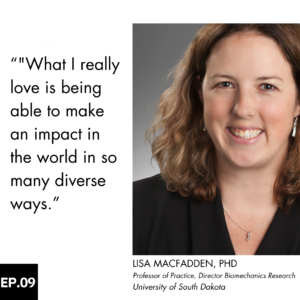In our recent podcast episode, we had the pleasure of speaking with Dr. Lisa MacFadden, a distinguished researcher and professor with extensive experience in biomechanics, robotics, and biomedical engineering. Throughout the conversation, Dr. MacFadden shared insights from her diverse career and discussed the exciting potential of integrating artificial intelligence with biomechanics to improve healthcare outcomes.
A Journey into Biomedical Engineering
Dr. Lisa MacFadden’s journey into biomedical engineering began with a strong desire to be a doctor, influenced by her father’s career as an anesthesiologist and her mother’s background in nursing. Despite initially resisting the idea of becoming an engineer, she eventually embraced her passion for applied math and science. This led her to pursue a degree in biomedical engineering, where she quickly found her niche in the field. Her background in volunteering at hospitals and participating in youth leadership forums on medicine provided her with a unique perspective that she applied throughout her career.
Innovations in Functional Electrical Stimulation
Dr. MacFadden’s work in functional electrical stimulation as a graduate student at the University of Utah was a significant highlight. She contributed to developing technologies that could restore muscle control in individuals with spinal cord injuries by bypassing the spinal cord and directly stimulating peripheral nerves. Her work in this area was pioneering and laid the groundwork for future advancements in neural interface technologies, similar to what companies like Neuralink are exploring today.
Addressing Ethical and Societal Implications of AI
The conversation delved into the ethical and societal implications of rapidly advancing technologies, particularly artificial intelligence. Dr. MacFadden emphasized the importance of ensuring that AI and related technologies are developed and used responsibly. She highlighted concerns about data privacy and the need for robust regulatory frameworks to protect sensitive medical information. The discussion also touched on the potential of AI to revolutionize biomechanics and medical research by making complex analyses more accessible and efficient.
Leading by Example and Mentorship
Dr. MacFadden shared her experiences in leadership and mentorship, emphasizing the importance of soft skills and interdisciplinary collaboration. She recounted how her leadership style evolved through various roles, from working in defense to leading research initiatives at Sanford Health and the University of South Dakota. She stressed the importance of giving honest, kind feedback and fostering a culture of trust and open communication within teams. Her approach to mentorship is reflected in her work with students, helping them develop both technical expertise and self-awareness.
Future Directions and Exciting Projects
Looking ahead, Dr. MacFadden discussed her excitement about several ongoing projects. She recently secured funding from the National Institutes of Health and support from the National Science Foundation to develop new tools for biomechanics research. She is also in the process of launching a startup company in South Dakota with one of her graduate students, aimed at creating accessible tools for collecting and analyzing biomechanical data. Additionally, she is involved in the Biomechanics Initiative, an international organization dedicated to inspiring high school students to pursue careers in biomechanics through engaging STEM events.
Conclusion
Dr. Lisa MacFadden’s contributions to the field of biomechanics and her vision for the future of medical technology are truly inspiring. Her commitment to improving healthcare through innovative research and her dedication to mentoring the next generation of scientists and engineers highlight the profound impact she has on the field. As technology continues to evolve, Dr. MacFadden’s work serves as a beacon of responsible innovation and a testament to the power of curiosity and positive energy in shaping the future of healthcare.
USD Discovery District: https://www.usddiscovery.com/
Favorable Environments: https://favorableenvironments.com/

